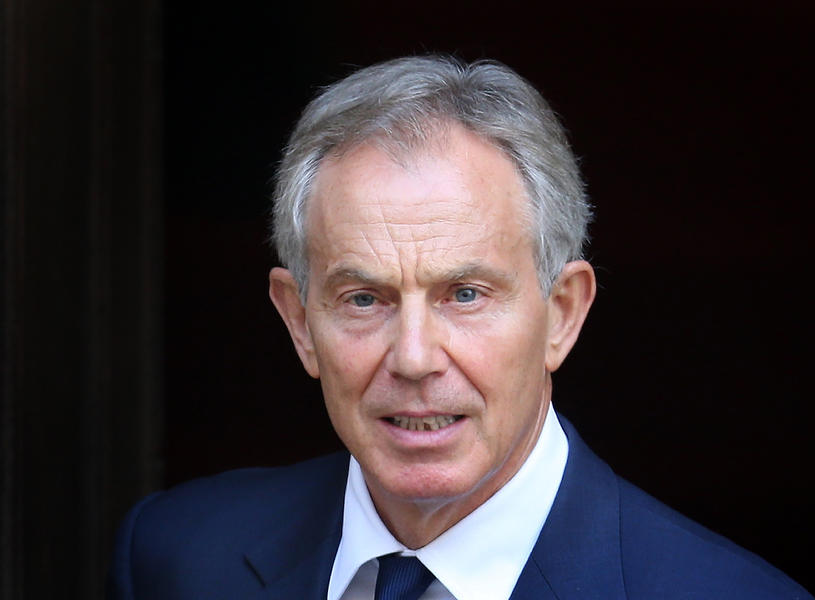Tony Blair outlines a seven-point strategy for defeating religious extremism


A free daily email with the biggest news stories of the day – and the best features from TheWeek.com
You are now subscribed
Your newsletter sign-up was successful
As world leaders spin their wheels on what to do about religious extremism, more and more public figures are voicing their own personal strategy opinions. Among them is former U.K. Prime Minister Tony Blair, who on Monday outlined on his website a seven-point strategy for countering religious extremism — despite being roundly criticized for joining America's controversial invasion of Iraq in 2003.
In his treatise, titled "The Way Ahead," Blair first emphatically denounces "radical Islamism," defining the problem as "deep" and "the work of a generation not an election cycle." He also repeatedly emphasizes the need for a broad coalition against such extremism, lauding U.S. Secretary of State John Kerry for "putting together a formidable array of allies" and making clear that "this is 'our' challenge and not simply 'theirs.'"
Blair is careful to draw a distinction between the radical Islamism of which he speaks and of the religion Islam, which he says focuses on "compassion and mercy." This ties into what he calls the "spectrum" of Islam — and he defines the crux of the issue as such:
The Week
Escape your echo chamber. Get the facts behind the news, plus analysis from multiple perspectives.

Sign up for The Week's Free Newsletters
From our morning news briefing to a weekly Good News Newsletter, get the best of The Week delivered directly to your inbox.
From our morning news briefing to a weekly Good News Newsletter, get the best of The Week delivered directly to your inbox.
The problem is that we're facing a spectrum of opinion based on a world view which stretches far further into parts of Muslim society. At the furthest end is the fringe. But at the other end are those who may completely oppose some of the things the fringe does and who would never themselves dream of committing acts of violence, but who unfortunately share certain elements of the fanatic's world view. ... This Islamism — a politicisation of religion to an intense and all-encompassing degree — is not confined to a fringe. It is an ideology… taught and preached every day to millions, actually to tens of millions, in some mosques, certain madrases, and in formal and informal education systems the world over. [Tony Blair Faith Foundation]
Read Blair's full essay at his website.
A free daily email with the biggest news stories of the day – and the best features from TheWeek.com
Kimberly Alters is the news editor at TheWeek.com. She is a graduate of the Medill School of Journalism at Northwestern University.
-
 How the FCC’s ‘equal time’ rule works
How the FCC’s ‘equal time’ rule worksIn the Spotlight The law is at the heart of the Colbert-CBS conflict
-
 What is the endgame in the DHS shutdown?
What is the endgame in the DHS shutdown?Today’s Big Question Democrats want to rein in ICE’s immigration crackdown
-
 ‘Poor time management isn’t just an inconvenience’
‘Poor time management isn’t just an inconvenience’Instant Opinion Opinion, comment and editorials of the day
-
 Nobody seems surprised Wagner's Prigozhin died under suspicious circumstances
Nobody seems surprised Wagner's Prigozhin died under suspicious circumstancesSpeed Read
-
 Western mountain climbers allegedly left Pakistani porter to die on K2
Western mountain climbers allegedly left Pakistani porter to die on K2Speed Read
-
 'Circular saw blades' divide controversial Rio Grande buoys installed by Texas governor
'Circular saw blades' divide controversial Rio Grande buoys installed by Texas governorSpeed Read
-
 Los Angeles city workers stage 1-day walkout over labor conditions
Los Angeles city workers stage 1-day walkout over labor conditionsSpeed Read
-
 Mega Millions jackpot climbs to an estimated $1.55 billion
Mega Millions jackpot climbs to an estimated $1.55 billionSpeed Read
-
 Bangladesh dealing with worst dengue fever outbreak on record
Bangladesh dealing with worst dengue fever outbreak on recordSpeed Read
-
 Glacial outburst flooding in Juneau destroys homes
Glacial outburst flooding in Juneau destroys homesSpeed Read
-
 Scotland seeking 'monster hunters' to search for fabled Loch Ness creature
Scotland seeking 'monster hunters' to search for fabled Loch Ness creatureSpeed Read
